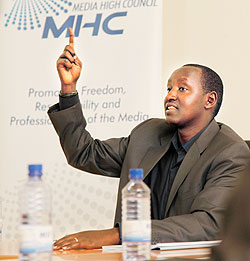Drama unfolded at the Media High Council offices on Monday, as management of the state media organ, Orinfor, publicly contested the council report that accuses it of lack of fairness in the coverage of the recent Senatorial elections. The media council released a report singling out Orinfor-affiliated outlets for not giving equal coverage to senatorial candidates.


Drama unfolded at the Media High Council offices on Monday, as management of the state media organ, Orinfor, publicly contested the council report that accuses it of lack of fairness in the coverage of the recent Senatorial elections.
The media council released a report singling out Orinfor-affiliated outlets for not giving equal coverage to senatorial candidates.
The report, in particular, says the state television, RTV, breached the officially approved campaign programme – which was developed by Orinfor itself.
By law, state media is obliged to provide equal access and equal coverage to all competing parties and individual candidates in elections for political offices in the country.
The official programme had been approved by all the 57 candidates countrywide.
"In terms of respect of the equal coverage principle (news coverage), Orinfor outlets, except La Nouvelle Releve (a French paper) and to an extent Radio Rwanda, remain wanting; yet considering the fact that the entire equal access and coverage programme had been drawn by Orinfor itself, one would have expected conformity without much strain,” the report reads in part.
But speaking to journalists, Willy Rukundo, the acting Director General of Orinfor, explained that some candidates failed to provide their adverts and other campaign messages.
He could, however, not clarify if the institution lacked resources to accomplish its duties as required.
"I cannot comment on the issue of resources; but all I can tell you is that we allocated all the resources we had during the campaign process, he said.
Sources claim Orinfor lacked adequate resources, including human and physical equipment, such as cameras.
Each candidate was entitled to 30 seconds per day (nine minutes and 30 seconds for the entire campaign period).
Some candidates’ spots, however, were longer than 30 minutes, while others were aired more than once a day, which resulted into extra time usage by some candidates.
Of the 57 candidates, RTV aired spots for only 35, while the Kinyarwanda newspaper, Imvaho Nshya, ran adverts for only 25 candidates.
Patrice Mulama, the Executive Secretary of MHC, called for the establishment of an internal monitoring mechanism to ensure compliance with regulations.
The report also recommended that Orinfor train its journalists on ethical standards to ensure that simple and basic procedures like informing the audience of changes in a schedule are respected.
It also recommended that the state media be equipped with more resources to effectively undertake its responsibilities.
Mulama added that the council would soon release a report on how both public and private media outlets fared in the provision of equal access and coverage during the campaign process.
Ends


